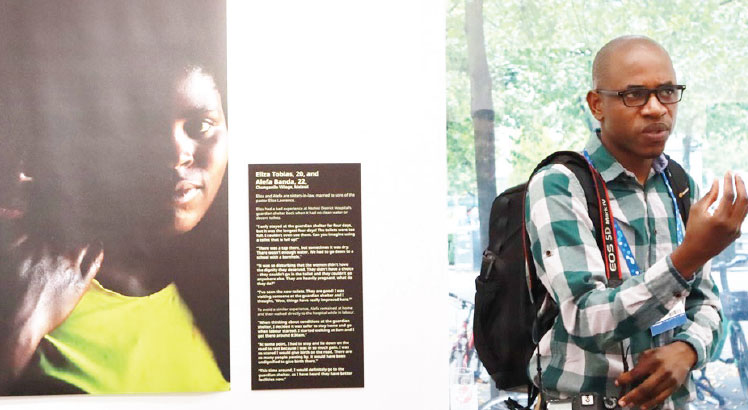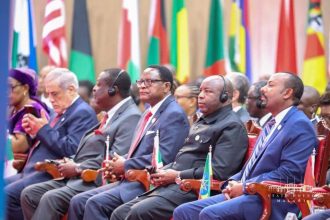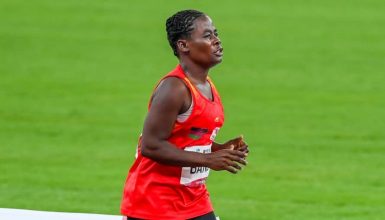Ntchisi mothers share Wash gaps
Printed on cotton cloth and waving gently as exhibitors pass by, mimicking the movement of water, photos of women in Ntchisi district hang on white walls at the Wettering Gallery in Stockholm, Sweden.
The moving photographs reveal Malawian women’s hopes and fears in small buildings next to local healthcare centres where expectant mothers and their helpers stay as they await labour, often without adequate access to water, sanitation and hygeine (Wash) facilities.
The Carrying Life photo exhibition by Laura El Tantawy attracted corporate partners, donors and other delegates during the World Water Week organised by the Stockholm International Water Institute last month.
The exhibition, initially shown in London earlier this year, celebrates the dignity and strength of women in Ntchisi.
One in five healthcare facilities in Malawi run without clean water on site, leaving mothers and babies at risk of deadly infections.

WaterAid also used the exhibition to showcase how the provision of clean water and decent toilets in four healthcare centres in Ntchisi has improved the women’s welfare during prenatal and postnatal stays.
Award-winning photographer El Tantawy explained how she photographed the Ntchisi women “not as victims, but filled with strength and resilience”.
Lustiya Samalani, a mother of four, was among the women featured in the exhibition. Her story shows how women cope with lack of Wash at a public healthcare facility.
She narrates: “Before WaterAid assisted us with water and sanitation facilities, staying at the guardian shelter was very challenging.
“Without water and a proper toilet, many patients would relieve themselves in nearby fields. Guardians at the facility would travel to a distant local borehole to fetch water for cooking, cleaning, and bathing. It was particularly hard for women without guardians; they could not travel to the borehole.”
The only water point in Samalani’s community is usually so congested that women scramble for water from as early as 3am.
“This presents many challenges for us to collect water in the dark. On average, I have to make three trips to the borehole to get enough water for the day,” she says.
Similarly, Alefa Banda’s image and story attracted huge interest during the event.
“I delivered my baby at Ntchisi District Hospital before WaterAid intervened. I stayed there for four days. Then the toilets were often filled up and I preferred going behind them. It was not dignifying for me and other pregnant women,” she explains.
Running water was also in short supply, pushing women to fill their buckets at a local school’s borehole.
“In my village, it is normal for women to do a lot of the work. Fetching the water, cooking and cleaning are all considered a woman’s job. That means travelling to the nearest water point four times, to collect 40 litres of water which takes not less than three hours,” said Banda.
Fainesi Gilbert, a farmer and mother to seven children, also shared her story.
She recalls: “When I took my eight-month-old grandson to the hospital with serious diarrhoea, I was told that the baby urgently needed water. However, they couldn’t find any as it was late at night. I had to leave my grandson at the hospital and went out to source some myself.”
When Gilbert accompanied her pregnant daughter to the hospital, she had to ask her other children to bring us water from home.
“I am now pleased that they have started pumping water straight to the facility now,” she says.
In Malawi, up to 63 percent of healthcare facilities do not have adequate toilets; 17 percent lack clean water and 56 percent have no hygiene facilities.
WaterAid has worked with the Wimbledon Foundation with the Malawi Government to provide clean water and decent toilets in the four health clinics in Ntchisi. This ultimately helps improve health outcomes for over 317 000 people. Women now wash themselves at their hospital and give birth without worrying about infection, giving children a good start in life.
Some 91 percent of the rural district’s population relies on agriculture and 53.5 percent live below the national poverty line.
Despite this, service provision in the district is generally skewed in favour of urban populations. Rural populations are often underserved with availability and quality of Wash services.
Minister of Health Khumbize Kandodo Chiponda champions Wash in healthcare facilities at local and global forums.
Her ministry has committed that all new facilities will be constructed with full complement of Wash facilities.
WaterAid continues its call for the minister specifically and Malawi Government to implement the commitment with urgency, starting with resourcing and implementing the Wash in Health Care Facilities’ roadmap.
During the World Water Week, players in the Wash sector, donors and government representatives discuss innovative ways for sustainable Wash delivery.
This year’s event focused on innovation amid unprecedented challenges.
Its theme—Seeds of Change: Innovative Solutions for a Water-Wise World—calls on humanity to rethink how we manage water by asking ourselves; which ideas, innovations and governance systems will we need in a more unstable and water scarce world.





